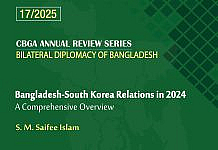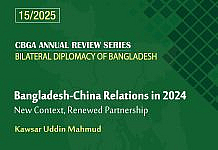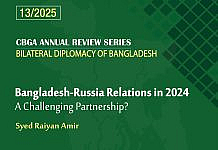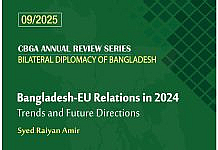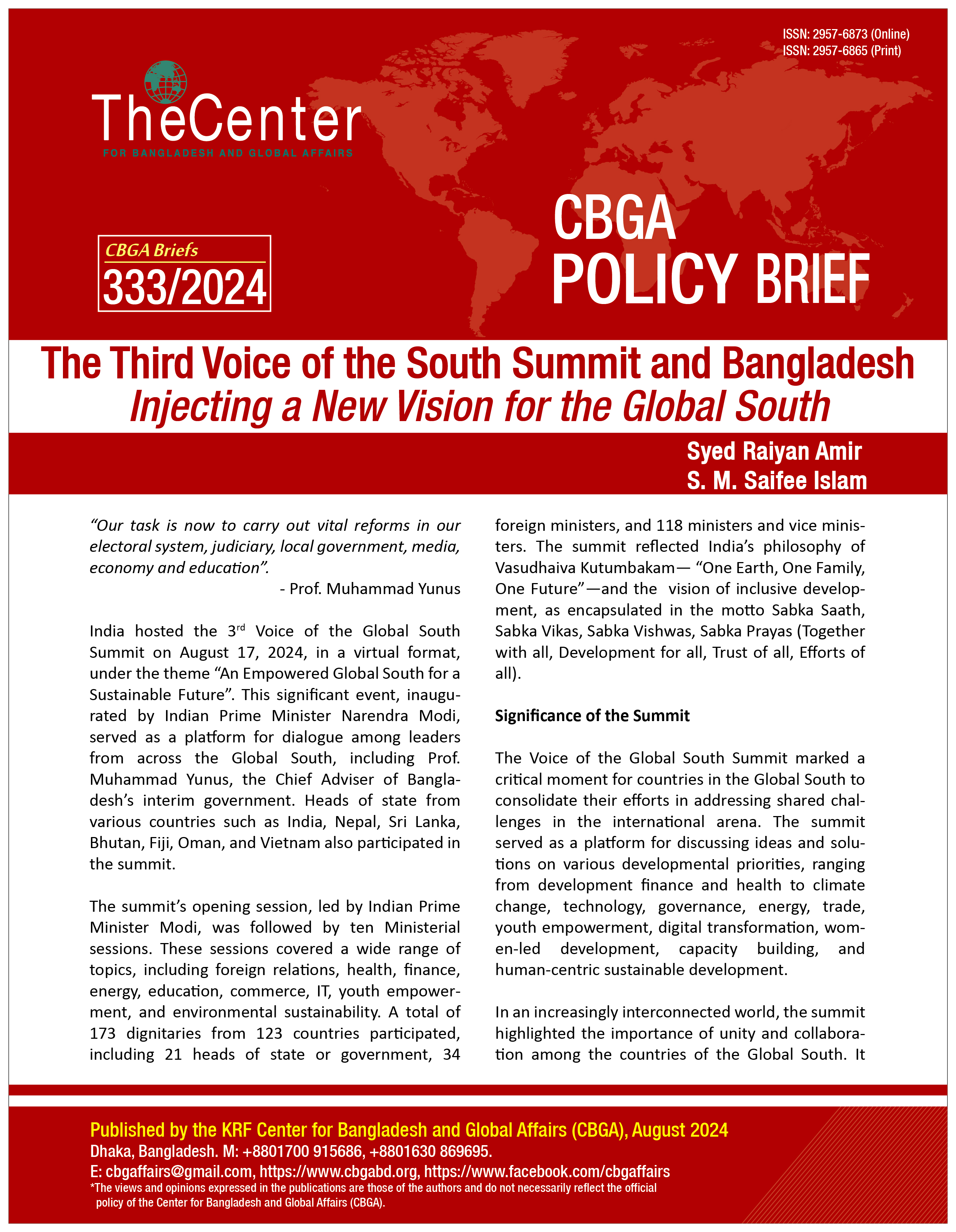
“Our task is now to carry out vital reforms in our electoral system, judiciary, local government, media, economy and education”.
– Prof. Muhammad Yunus
India hosted the 3rd Voice of the Global South Summit on August 17, 2024, in a virtual format, under the theme “An Empowered Global South for a Sustainable Future.” This significant event, inaugurated by Indian Prime Minister Narendra Modi, served as a platform for dialogue among leaders from across the Global South, including Prof. Muhammad Yunus, the Chief Adviser of Bangladesh’s interim government. Heads of state from various countries such as India, Nepal, Sri Lanka, Bhutan, Fiji, Oman, and Vietnam also participated in the summit.
The summit’s opening session, led by Indian Prime Minister Modi, was followed by ten Ministerial sessions. These sessions covered a wide range of topics, including foreign relations, health, finance, energy, education, commerce, IT, youth empowerment, and environmental sustainability. A total of 173 dignitaries from 123 countries participated, including 21 heads of state or government, 34 foreign ministers, and 118 ministers and vice ministers. The summit reflected India’s philosophy of Vasudhaiva Kutumbakam—”One Earth, One Family, One Future”—and the vision of inclusive development, as encapsulated in the motto Sabka Saath, Sabka Vikas, Sabka Vishwas, Sabka Prayas (Together with all, Development for all, Trust of all, Efforts of all).
Significance of the Summit
The Voice of the Global South Summit marked a critical moment for countries in the Global South to consolidate their efforts in addressing shared challenges in the international arena. The summit served as a platform for discussing ideas and solutions on various developmental priorities, ranging from development finance and health to climate change, technology, governance, energy, trade, youth empowerment, digital transformation, women-led development, capacity building, and human-centric sustainable development.
In an increasingly interconnected world, the summit highlighted the importance of unity and collaboration among the countries of the Global South. It provided a venue for these nations to voice their perspectives, share their experiences, and explore cooperative strategies to overcome the unique challenges they face. This summit was particularly relevant in the context of global power dynamics, where the collective strength of the Global South can play a pivotal role in shaping the future of international relations and global governance.
The Chief Advisor’s Speech: A Vision for Bangladesh and Beyond
During the summit, Prof. Muhammad Yunus delivered a speech that underscored the interim government’s commitment to a peaceful transition toward an inclusive and pluralistic democracy in Bangladesh. He emphasized that one of the primary tasks of his government is to carry out vital reforms across several key areas, including the electoral system, judiciary, local government, media, economy, and education. These reforms, according to Prof. Yunus, are essential to creating an environment conducive to free, fair, and participatory elections.
Prof. Yunus extended an invitation to the heads of state who participated in the summit, encouraging them to visit Dhaka soon. He remarked that they might miss something important if they delayed their visit. His light-hearted yet earnest invitation reflected his desire to strengthen Bangladesh’s ties with other nations and to showcase the positive changes occurring in the country.
In his speech, he also highlighted a unique phenomenon in Dhaka, where young students and children as young as 12 or 13 have taken to painting the walls of the 400-year-old city with images of a “new, democratic, environment-friendly Bangladesh.” This spontaneous outpouring of creativity and commitment from the youth, without any central planning or budget support, is a testament to the deep-seated desire for change and progress in the country. Prof. Yunus described this as part of the “Second Revolution,” a movement led by the youth that is inspiring similar efforts across the Global South.
- Placing Youth at the Heart of the Global South’s Strategies
Prof. Yunus emphasized the importance of placing youth and students at the center of the Global South’s strategies. He noted that two-thirds of the population in the Global South are young people, who represent the most powerful segment of society. This demographic, according to Prof. Yunus, is different from previous generations in terms of their commitment to creating a new world, their capabilities, and their technological prowess. He expressed confidence in the youth’s ability to turn the impossible into possible and stressed the need to redesign systems to better support their potential.
Prof. Yunus pointed out that the current education and financial systems are primarily designed to create job seekers and to provide jobs. However, he argued that these systems need to be rethought to encourage entrepreneurship and to ensure that wealth is shared more equitably among all people, particularly women and youth. His call for a redesign of the financial system to prevent wealth concentration and promote financial inclusion is rooted in his lifelong experience in working to alleviate poverty and empower marginalized communities.
- A Legacy of Struggle and Inspiration
Reflecting on Bangladesh’s history, Prof. Yunus reminded the summit participants of the sacrifices made by Bangladeshi students in 1952, who gave their lives for the right to speak their mother tongue. This historic struggle, he noted, has inspired movements for linguistic rights and cultural preservation around the world. Prof. Yunus drew a parallel between this past struggle and the present-day “Second Revolution” led by the youth of Bangladesh. He expressed pride in being the oldest “young person” participating in this revolution and in supporting the youth’s efforts to raise their voices for democracy, human rights, dignity, equality, and shared prosperity.
A New Chapter for the Global South
The Voice of the Global South Summit, with its emphasis on collaboration, innovation, and youth empowerment, represents a new chapter in the history of the Global South. It is a chapter marked by a renewed commitment to addressing the challenges faced by developing countries and by a collective effort to build a more equitable and sustainable future.
Prof. Muhammad Yunus’s speech at the summit highlighted the critical role that Bangladesh, under its interim government, intends to play in this new chapter. By focusing on reforms, youth empowerment, and financial inclusion, Prof. Yunus has outlined a vision for Bangladesh that aligns with the broader goals of the Global South. His leadership, coupled with the collaborative spirit of the summit, offers hope for a future where the Global South can achieve its aspirations and contribute to a more balanced and just world order.
As the Global South moves forward, the principles of inclusive development, solidarity, and shared responsibility will be crucial in charting the complex challenges of the 21st century. The summit and the Chief Advisor’s speech have set the stage for a collective journey toward a brighter future, where the voices of all nations, particularly those of the Global South, are heard and respected on the global stage.
– Syed Raiyan Amir is a Senior Research Associate and S. M. Saifee Islam is a Research Associate at the KRF Center for Bangladesh and Global Affairs (CBGA).



